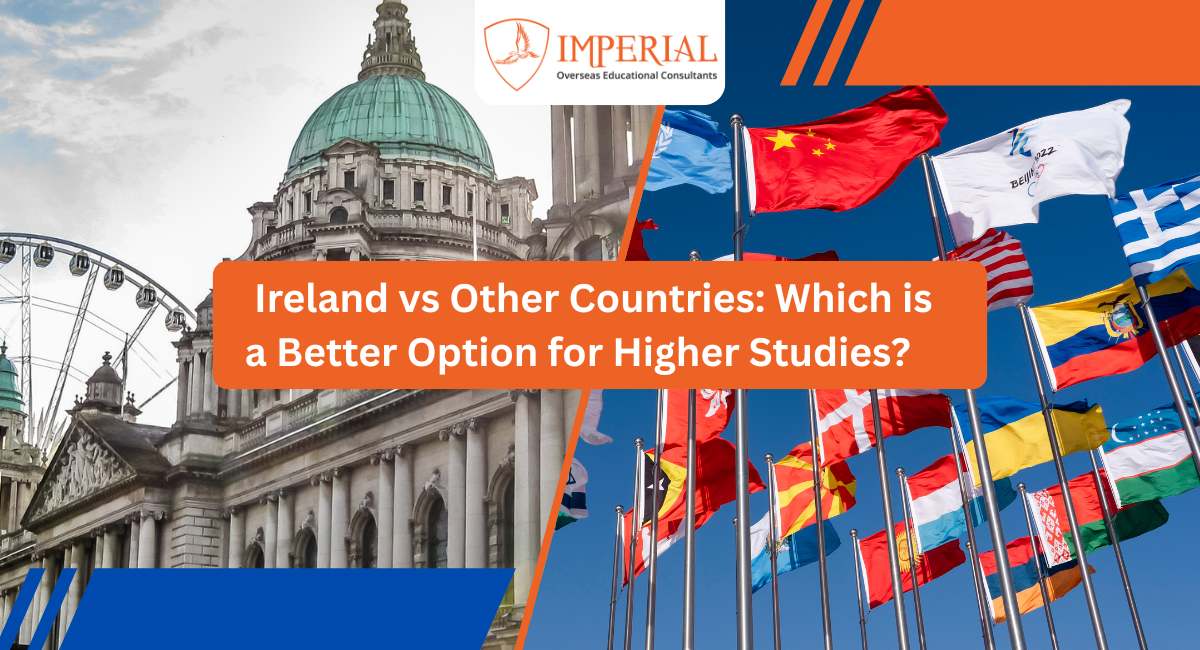
How Much Does It Really Cost to Study in Ireland? A Guide for Indian Students
Are you dreaming of studying in a land with green fields, cosmopolitan cities, and high-quality education? Study in Ireland is quickly emerging as one of the preferred choices for Indian students who want to earn a global degree at a reasonable cost without compromising on safety and quality. So, how expensive is it? Here is a complete breakdown, which is realistic, practical, and detailed, helping students know what to expect when they choose Ireland for higher studies.
Understanding the Real Cost of Studying in Ireland
From tuition fees to daily living, several factors influence how much it really costs to study in Ireland from India. Let’s break them down one by one.
1. Tuition Fees – The Biggest Expense
A large portion of the cost of your study in Ireland will probably include your tuition. Fees are, however, dependent on the level of education and the course.
| Program Type | Average Annual Fees (EUR) | In INR (Approx.) |
| Undergraduate Courses | €9,000 – €13,000 | ₹8 – ₹12 lakhs |
| Postgraduate Programs | €10,000 – €18,000 | ₹9 – ₹16 lakhs |
| MBA/Medical Courses | €20,000 – €30,000 | ₹18 – ₹27 lakhs |
The tuition fees charged in public universities may be a bit lower than those charged in private universities. It is important to always research scholarships that will greatly reduce your expenses.
2. Application Fees & Entrance Tests
Before you start to secure a seat in a university, some initial expenses should be noted. When you consider study in Ireland from India, the following standard charges should be kept in mind –
- Application fee: €35–€50 per university
- IELTS/TOEFL: ₹15,000 – ₹20,000
- Student visa fee: €60 (approx. ₹5,000)
Do not forget to calculate the amount of document translation or notarization in case your records are not in English.
3. Living Expenses in Ireland
The cost of living differs depending on the city, lifestyle, and accommodation. Compared to Galway or Limerick, Dublin, as the capital, is more expensive.
These are city-wise figures for Indian students who want to go to Ireland for higher studies-
| City | Monthly Living Cost (EUR) | Approx. in INR |
| Dublin | €1,200 – €1,500 | ₹1.1 – ₹1.4 lakhs |
| Cork | €1,000 – €1,200 | ₹90K – ₹1.1 lakhs |
| Limerick/Galway | €800 – €1,000 | ₹75K – ₹90K |
Includes: Rent, food, transport, utilities, and leisure
4. Accommodation Options
Another big consideration in Ireland education costs is housing. A few of the options for you are –
- On campus accommodation (€400-€800 euro/month)
- Shared apartments (€300EUR-€600EUR/ month)
- Homestays (€500-€900euros/month)
Student accommodation is also much less expensive in cities outside Dublin. Early booking and living in groups decrease expenses.
5. Transportation Costs
Transport is very reliable, and that is the reason that most people use public transport. Students from India may obtain a Student Leap Card that provides them with discounted public bus, tram, and train travel.
- Monthly travel pass – 50 -70 euro (4,500 -6,000 rupees)
- Biking – Some students purchase second-hand bikes, which cost about 100-150 Euros
When you decide to move to Ireland from India and are not willing to use a taxi or hire a car to get around, the public transport will work as your lifelong companion.
6. Food & Daily Expenses
The provision of food security is also bound to influence the overall study in Ireland cost through groceries and restaurants. It can save a lot by cooking at home.
- Groceries: €150–€250/month
- Dining out: €10–€15 per meal
- Coffee/snacks: €2–€5
Most cities have Indian stores, which facilitate the possibility of keeping to a familiar diet at an affordable cost.
7. Health Insurance
International students must have valid health insurance in Ireland. This is being done in many universities as part of the onboarding.
- Annual health insurance – €150-€200 (13,000 -18,000 rupees)
This is vital for visa purposes, and it includes GP visits, emergencies, and basic care.
8. Part-Time Work Opportunities
The fact that students can work during studies is one of the reasons why people prefer to study in Ireland. With a valid visa, Indian students can work-
- 20 hrs/ week during semesters
- 40 hours/week in holidays
Part-time employment is on average €10–€12 per hour. This works as a great help in your daily expenses.
9. Scholarships and Grants
The cost of education in Ireland may be a major cause of concern amongst Indian students, but they can always make a difference with scholarships.
- Government of Ireland International Education Scholarship
- University-specific merit-based awards
- India-Ireland Education Exchange Programs
Some scholarships may pay full or part of the tuition fee, or give monthly stipends. It is always good to check the eligibility early and apply before the deadlines.
10. Cost Comparison: Ireland vs. Other Countries
This is how the study in Ireland cost compares to other popular destinations –
| Country | Avg. Tuition (EUR | Living Cost (EUR/month) |
| Ireland | €10,000 – €18,000 | €1,000 – €1,200 |
| UK | €12,000 – €20,000 | €1,200 – €1,500 |
| Canada | €11,000 – €17,000 | €900 – €1,100 |
| Australia | €15,000 – €25,000 | €1,200 – €1,500 |
Ireland represents great value, taking into consideration the quality of education, cultural experience, and job opportunities.
Final Thoughts
If you are going to study in Ireland from India, you are making a good investment in your future. Ireland has some of the best universities, and the country is friendly. In addition, it has a post-study work visa, which makes it a destination with a high ROI. Having the information about the study in Ireland cost will allow you to make sound choices and manage your budget wisely.
Start your journey with expert guidance—connect with Imperial Overseas and make your dream of studying in Ireland a reality.



